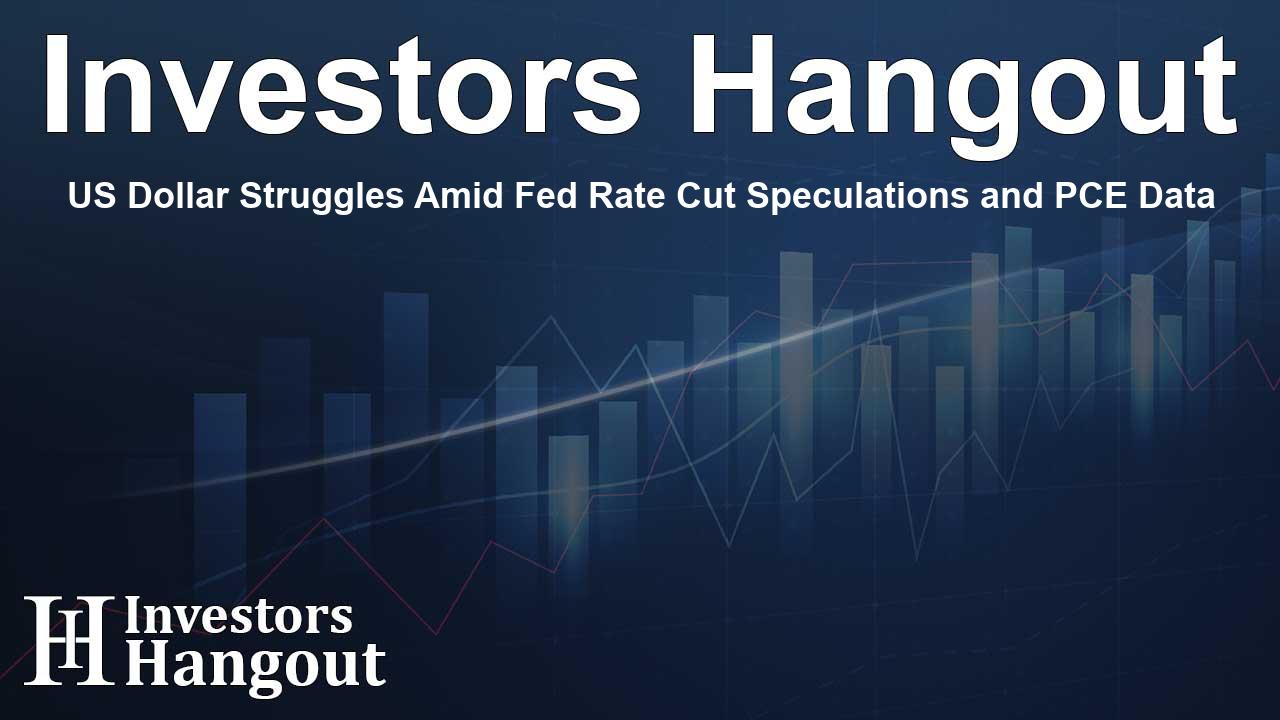US Dollar Struggles Amid Fed Rate Cut Speculations and PCE Data

Challenges Facing the US Dollar
The US dollar is currently navigating through turbulent waters, hovering near three-year lows. As the market opened in Europe, the dollar's index against a basket of currencies was poised for a weekly decline of 1.5%. The improving situation in the Middle East has faded its safe-haven appeal, coupled with rising expectations for multiple Fed rate cuts this year, diluting the dollar's recovery potential.
Despite positive headlines regarding the White House reaching a trade agreement with China and the anticipation of ten new deals, the dollar remains sluggish. These developments have provided only temporary relief to the flagging greenback, suggesting that it might struggle to regain its strengths any time soon.
Market Reactions to Mixed Economic Data
The recent release of several economic indicators in the US has stirred uncertainty about the immediate need for a Fed rate cut. With Chair Powell's recent comments alongside others leaning dovishly, it seems that there’s no consensus for an imminent reduction. For example, durable goods orders saw a notable increase of 16.4% in one month, while non-defense capital goods orders grew by 1.7%.
Additionally, weekly jobless claims have shown a decrease, although continued claims are reaching levels not seen since the pandemic began. On a concerning note, GDP growth for the first quarter was revised down, revealing a greater contraction mainly attributed to lower consumer spending.
As traders await the core PCE inflation numbers, which serve as a vital gauge for the Fed, expectations are that the index likely rose by just 0.1% month-over-month. In contrast, the core PCE's annual figure may slightly increase to 2.6%. Any disappointments in these figures could prompt a surge in expectations for a third 25-basis point reduction in this current year, placing additional pressure on the dollar.
Rally in Global Equity Markets
On a more optimistic note, equity markets have brightened, with major indices, including Nasdaq 100 and the MSCI All Country World Index, achieving record close heights. The tech sector has been particularly buoyed by enthusiasm surrounding AI advancements, exemplified by Nvidia hitting an unprecedented all-time high.
Market sentiments are further kindled by the outlook of possible trade agreements between the Trump administration and key trading partners, expected to be finalized before significant deadlines.
Implications of Potential Trade Deals
In a recent interview, US Commerce Secretary voiced optimism about the finalized trade understanding with China and hinted at reaching agreements with up to ten additional countries. However, he cautioned that those nations unable to strike a deal by the impending deadline would receive official communications outlining the future trade terms. Despite this, many market participants remain skeptical that the US will risk reinstating higher tariffs, especially concerning crucial trading partners, predicting instead further extensions.
Moreover, some positive developments emerged as Treasury Secretary announced the cancellation of a contentious 'revenge tax' included in the House budget, reflecting a deal reached with G7 nations to exempt the US from certain taxes imposed by their countries.
Market Sentiments Toward Safe Havens
While the overall atmosphere is lifting risk sentiments, it is negatively impacting traditional safe havens, including gold, oil, and the yen. The market is eagerly awaiting the congressional vote on the budget bill anticipated to pass before the July 4 holiday, amidst ongoing plummeting oil prices, which have dropped more than 10% this week.
The euro, meanwhile, was last observed testing the $1.17 mark while the yen continues to face struggles near the 144 threshold against the dollar, compounded by disappointing CPI figures for the Tokyo area. Gold has breached the $3,300 mark, experiencing lows not seen in the past month, likely influenced by the ongoing stability between regions and a measured approach from the Trump administration toward trade tensions.
Frequently Asked Questions
What is currently happening with the US dollar?
The US dollar is struggling at three-year lows due to diminishing safe-haven appeal and rising expectations of Fed rate cuts.
How do economic indicators influence the markets?
Recent mixed economic data signals uncertainty concerning the urgency of Fed rate cuts, which impacts market sentiment and currency values.
What recent developments have occurred in global equity markets?
Global equity markets, led by the Nasdaq 100, are experiencing record highs bolstered by optimism surrounding AI and potential trade agreements.
What is the significance of the upcoming core PCE data?
Core PCE data is crucial as it helps gauge inflation trends, potentially influencing Fed decisions on rate cuts.
How are safe-haven assets responding to current market sentiments?
Safe havens like gold and the yen are declining as risk sentiments rise with optimistic market developments and looming trade deals.
About The Author
Contact Lucas Young privately here. Or send an email with ATTN: Lucas Young as the subject to contact@investorshangout.com.
About Investors Hangout
Investors Hangout is a leading online stock forum for financial discussion and learning, offering a wide range of free tools and resources. It draws in traders of all levels, who exchange market knowledge, investigate trading tactics, and keep an eye on industry developments in real time. Featuring financial articles, stock message boards, quotes, charts, company profiles, and live news updates. Through cooperative learning and a wealth of informational resources, it helps users from novices creating their first portfolios to experts honing their techniques. Join Investors Hangout today: https://investorshangout.com/
The content of this article is based on factual, publicly available information and does not represent legal, financial, or investment advice. Investors Hangout does not offer financial advice, and the author is not a licensed financial advisor. Consult a qualified advisor before making any financial or investment decisions based on this article. This article should not be considered advice to purchase, sell, or hold any securities or other investments. If any of the material provided here is inaccurate, please contact us for corrections.
